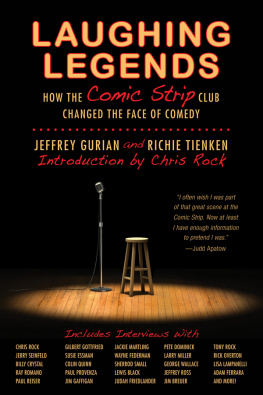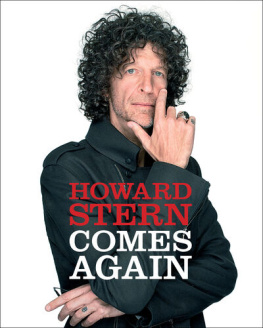Seinfeld
The Making of an
American Icon
J ERRY O PPENHEIMER

For Caroline and Cuco
Contents
Stars can succeed by concealing who they are. Comedians cant.
Jerry Seinfeld
H is citythe New York City he introduced to middle America; the city whose foibles and characters and neurosis and buzzwords have become part of the national lexicon and consciousness; the city everyone thought they knew from watching his show; his city of movie theater lines and Chinese restaurant waiting lists and gymnasium saunas and fascist soup stand proprietors and inane coffee shop booth chatter and parking space battles and oddball neighbors and eccentric bosses and yada, yada, yada about nothing; his city, which was as much a character of his show as the players themselveswas burning on that sparkling Tuesday, September 11, 2001.
Jerry had awakened early, but it was still dark where he was, which was some fifteen hundred miles west of, and two time zones earlier than, what would become known as Ground Zero. Like so much of his adult life, Jerry was on the road, in a hotel room that horrific morning, in a suite at the Charter at Beaver Creek, a luxurious Rocky Mountains getaway, in Colorado.
It was shortly after 6:30 A.M. , mountain daylight time, and he had requested an early wake-up call because he was scheduled to take the wheel of one of his $300,000 classic 50s Porsche Speedsters and participate with eighty-five other high-rollers in the Colorado Grand Vintage Car Rally, a charity event. In the past, most of the money had been raised for HIV patients; this year it was for research and treatment of bipolar manic depression. At a pre-rally brunch, the watch company Girard-Perregaux auctioned off for $20,000 one of its vintage chronographsthe kind of timepiece Jerry likes to sport on his wristfor the cause.
After showering, washing his hair, flossing and brushing, Jerry automatically reached for the remote, tuning to his old network, NBC, and the Today show, to find out what, if anything, was happening that might impact his very narrow and focused world. Stunned and shocked, he watched when the twin towers were hit, sat paralyzed when they came tumbling down.
That, he later intoned, was the end of the old world.
Unlike the years when he suffered from fear of commitment and had no one but himself to think about, Jerry now had familial responsibilities: nearing fifty, a bit paunchy in the face, his hair shorter, but boyish looking, like an aging Jerry Lewis, he had a young wifewho would turn thirty the next day, September 12and a ten-month-old daughter, waiting for him in New York. Indeed, the sneak attack had a very direct, profound, and frightening impact on Americas most beloved comic.
He immediately tried to call home, but the lines were already fried by millions of other concerned callers; he ordered the front desk to continue trying, as he attempted unsuccessfully to get through on his cell phone, but all service was disrupted by the unprecedented assault and national panic.
Some thirty minutes north by limo from the World Trade Center was Jerrys nineteenth-floor palatial duplex, purchased from the violinist Isaac Stern in the tony Beresford, an elegant aerie overlooking Central Park.
Jerry had spent tens of thousands to renovate his new home beyond the $4 million and change he had paid for it, and thousands more in fines for exceeding the year-long renovation period tenants are allowed, all of which was chump change to the one-time poor boy from blue-collar Long Island who had become very wealthy from being very funny. Just weeks before, the Seinfelds had finally moved in to their sleek home, having previously stayed in a backup apartment nearby, or at his $32 million East Hampton estate. Not far from his new apartment was a $1.39 million state-of-the-art garage undergoing renovation for twenty of his valuable Porsches.
For many years, Jerry had lived in predominantly gay West Hollywood, not that theres anything wrong with that, and had considered living in Greenwich Village, another gay bastion, before he moved back to New York after Seinfeld ended its run and he had met his future wife. He chose the Upper West Sidethe setting for his showa community of young families and singles, after asking himself, Which is more annoying to me, babies or homosexuals?
Because he was in Colorado, Jerry apparently had no plans to be home to celebrate the milestone birthday of his wife, Jessica, whose relationship and marriage caused a scandal of seismic scale when she dumped her first wealthy husband within days of their summer 1998 honeymoon for the wealthier and more famous comedian. Now, with the Seinfelds marriage going on two years, they had a show-business marriage: though a loving father and devoted husband, Jerry often traveledhis lifelong mistress was stand-up, and now that Seinfeld was over he was back on the road, hoping to fulfill a dream, being the best stand-up ever, and doing his shtick on the stage of the Palladium in London when he reached a hundred.
Luckily for both of them, the former Jessica Sklar Nederlander was able to balance her husbands dual livesthe professional and the domestic. Even if he was just playing with one of his cars in Colorado on her birthday accompanied by a boyhood pal, she thrived on being Mrs. Jerry Seinfeld, on seeing her name in the columns. If he ever were to get married, Jerry promised himself years earlier, it would be to a woman who was Jewish and who was willing to happily share him with his first love. Jessica filled the role perfectly.
With a nanny for the babythe servant had her own $2,000-a-month apartment paid for by JerryMrs. Seinfeld started a charity for needy children, and was free to hang out with her girlfriends, and to shop. If anything, the once-poor girl from upstate Vermont had developed into a world-class shopper, buying only the best for herself and baby Sascha.
When word of the attack reached the hotel in Colorado, a number of New Yorkers in the rally immediately drove their collector cars east; they had no choice because all planes were grounded for the duration of the emergency. Jerry didnt return to New York until the end of the week, when he was able to charter a private plane. On arrival, he felt as though he had walked into a room where somebody had just died, he said later. The quality of the air had changed. There was a density to it.
Back home, Jerry followed in the footsteps of other great funnymen, childhood comedic idolsthe Bob Hopes, the Abbott and Costellos who rallied for their nation during previous times of war: he went on the road to entertain a shaken citizenry. In Charlotte, North Carolina, he did two shows for five thousand of the anguished who responded positively, needing the laughter, forgetting for an hour or so the horror, to deal with what Jerry saw as the new world.
In a way it identifies us as Americans, Jerry said, after feeling the audiences reaction, what I would call classic American behavior, an act of defiance and a way of striking back. Ironic humor people coming back with a vengeance, returning to our lives with great glee.
About a month after the attack, he was at the forefront of a comedy fund-raiser at Carnegie Hall, with the proceeds going to the Twin Towers Fund, the relief charity established by Mayor Giuliani for the families of the police and firemen who had perished, raising $1,859,400. Among the comics he enlisted was Bill Cosby, whose brilliant comedy albums inspired Jerry as a kid in the 60s to become a stand-up. He also brought on board his longtime friend, George Wallace, a black stand-up comic, who had been Jerrys roommate, confidant, and the best man at his wedding.
Next page










